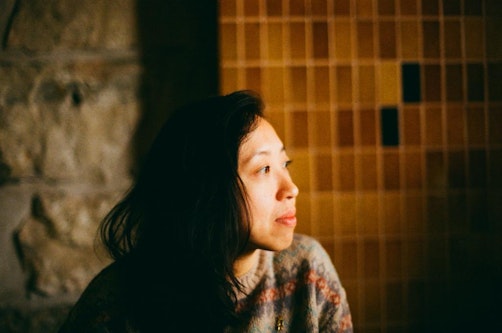Mild Animals
Candice Chung
When Yuki phoned her sister before setting off on a work trip to Yogyakarta, she was given one piece of advice.
“Why don’t you sleep with someone?” said Jo.
The two sisters have a habit of calling each other before boarding a flight. Often, there’s not much to say except for fly safe and don’t order the fish. That Jo decided to go off script by suggesting adultery was odd, though not altogether surprising. For a while, Yuki has suspected that her sister — a biochemist with three kids — enjoys living out her own escape fantasies through her. This habit escalated recently, when Jo and her partner started toilet training Eleanor — a tiny, erratic Beagle-Spaniel beloved by their oldest, and the most allergic.
Still, it was an unusual thing to say. Not least because her sister knows she and Ben are the kind of couple who tell each other everything. Together, they share an unwavering, almost anti-social commitment to frankness. Sometimes this means pointing out that an oatmeal shirt makes Ben’s pale torso disappear; other times, it means saying outright that they need an orgasm or some personal space. Clarity, as Ben likes to say, is what sets you free. To love is to practice transparency — a state that, while Yuki agrees with, is probably what makes some long-term lovers a touch ghostly.
“You need to let off some steam,” Jo continues, possibly needing to let off some steam.
“You’re saying I should relax by cheating on Ben.”
“No one’s asking you to slack off. I get this is a work trip.”
It’s true that Yuki has been feeling a little stressed. The first few months after getting engaged can be a stressful time, her therapist said.
To make matters worse, ever since she shared the news of her engagement with family and friends, Jo has been urging her to ‘get things out of her system’. This makes Yuki picture her life as a vast, plumbing system — and she’s being asked to fish unspeakable things out of it.
On the other end of the line, Eleanor starts barking. Soon, one of her nieces joins in — small yelps, then confident, full-blown howls. Before long, her sister is shouting too close to the receiver, her voice swallowed by the assorted animal sounds.
“Jo, I gotta go.”
Yuki checks her boarding time. Ten more minutes.
“Look, I’m just trying to help,” says Jo. “I don’t like the way you’ve been acting. No texts, no updates. You’re doing that quiet old man thing.”
She senses a heaviness in her sister’s voice and she can tell she is thinking about their father. She pictures the faraway look on Jo’s face. The way her eyes glaze over and her face starts to flush when she is trying to remember a forgotten word or a name.
“I’m OK.”
“Yeah, that’s what OK people say.”
Yuki looks at her phone. Five more minutes.
“Well, don’t forget to come back.”
“You bet.”
It’s their classic sign-off. An in-joke that doesn’t seem to get old no matter how many times they’ve said it through the years.
***

Illustration by Van Low. Commissioned for Mild Animals, 4A Papers, 2023
It’s a wet July morning at the airport. Rain pelts the floor-to-ceiling window at the departure lounge, making small, flower-shaped splatters that bloom and disappear as soon as they hit the glass. This is her first press junket after the pandemic. Seven days of sightseeing and reporting during a local art festival, then a final night at an artist’s retreat near Indonesia’s most active volcano — Mount Merapi. The first time she was invited to a famil, she remembered asking what it is. Famil — short for familiarisation. A trip that gives you a sense of a place and its people. Intimacy minus time.
Up in the air, Yuki falls into a shallow sleep. In one dream, she takes tea with Eleanor. They are sitting at a small, linen-covered round table; perched at the foot of a volcano. The puppy has grown older, elegant. Her long ears black and glossy, falling just so on her shoulders. She reminds her of the author Sally Rooney.
“Help yourself,” says her sister’s dog.
There is nothing to eat or drink at the table. Only a display of matching china. In the distance, soft plumes of steam rise from Mount Merapi, which hisses like a kettle. She wonders if they should get their cups ready.
“Help yourself,” Eleanor says again.
She shows Yuki what to do by picking up a cup — then calmly lets go and drops it on the ground. She does the same with the saucer, then another cup, and keeps going until the ground is covered with petals of broken porcelain. It is beautiful. When Yuki tries to do it herself, she jolts awake — startled by its loud, terrible sound.
At the welcome dinner in Yogyakarta, Yuki notes how much her travelling companions resemble cast members of her favourite Japanese reality TV show — a bookish lot with casually excellent hair. All of them have an air of being plausibly famous. Jarrod, the most obviously beautiful, is the first to introduce himself. A staff writer for the weekend section of a broadsheet, he has an easy charm that makes you forget the centre-right leanings of his paper and instantly warm to him. He is the kind of person Yuki’s sister would’ve pictured when she said, sleep with someone.
“My boss told me to have fun in Bali,” his eyes a thin line when he smiles. “I had to remind him I was going to the island without the bogans.”
Yuki says she isn’t so sure about that. At the restaurant, there are Australian accents all around. Their fixer Indira explains this is one of the few neighbourhoods with bars and restaurants that serve alcohol; making them popular with foreigners. It is true that most tables are dotted with bottles of Bintang. Some people are working on their laptops, while others are busy making sense of their menus or travel plans.
At their table, her companions are merrily studying each other over slick plates of noodles and crisp gorengan. The young editor from an inflight magazine starts flirting with Jarrod. She is talking about an interview he did with a beloved Japanese pop artist, which Yuki also read five minutes before she left the hotel.
“Would you like that last piece of tempeh?” the journalist next to her asks. His name is M.
Yuki shakes her head.
“I was hoping you wouldn’t.”
The truth is, she would. But like him, she has been too polite to take it. And now, the tempeh fritter is cold.
“I’m starving,” he smiles. “I didn’t think those guys would want a cold fritter.”
“But I would?”
“You said you write about food.”
“So —“
“So you have an iron stomach. I assumed you would eat anything!”
She couldn’t quite place his accent. He has coppery stubbles and almost-blond eye lashes. Yuki knows it’s rude to say, where are you from? But she isn’t altogether sure what the rules are for a white person.
“Have you had far to travel?” she asks.
“No, I live here.”
“In Yogyakarta?”
“Jogja.”
“What’s it like living in Jogja?”
He points at his mouth, which is busy finishing her tempeh. When he’s done, he splits the last of his beer with her.
“Jogja is what locals call this city. I live in Jakarta. I work as a stringer for news bureaus back home.”
At this, she gives a slow, thoughtful nod. For some reason, this makes M. laugh.
“You want to ask where I’m from.”
“What?”
“I’m from Glasgow. Born and bred.”
Yuki has not met a real-life Glaswegian. Besides a band that all of her friends liked in the 2000s, she couldn’t think of a single reference. Also, she couldn’t tell if M. was being rude or just straightforward. She did, however, notice a wedding band on his finger. Surprisingly, she feels a sense of familiarity towards him. If only an iota more than the maybe-famous journalists.
While the group shuffles out of the restaurant, M. waits for Yuki.
“Now —” which he pronounces as ‘no', “How do you feel about eating some more?”
***
That night, in her hotel room in Jogja, she texts Ben before bed: a screenshot of her local number, queues at the airport and some outtakes from the evening with brief, silly captions. “My sister thinks I should have an affair with him,” she writes, drawing three red arrows pointing at Jarrod. She doesn’t mention M., whom she turned down for supper.
Ben texts back a cry-laugh face.
She thinks of their first dinner together. How they had lived for months as flatmates in their Inner East share-house by then. That evening, he came home with two takeaway boxes of still-warm pasta. His girlfriend had broken up with him at the restaurant, after ordering and before the food arrived. Why couldn’t she say anything earlier? He smiled. Yuki heard his voice shaking. She had never seen him emotional before that night. Quietly, she opened one of the boxes and started picking out linguini strands with her fingers. She ate the chilli rings and the little clams. Without speaking, Ben finds two forks from the kitchen, hands one to Yuki and they kept eating like that — as if all along this had been their dinner plan. A few months later, they got together. Since that night, it’s been nine years.
***

Illustration by Van Low. Commissioned for Mild Animals, 4A Papers, 2023
The second day passes quickly. Already, Yuki can count up to six in Bahasa (thanks to Indira’s requests of ‘table for six’). Her mind is a jumble of yes, no, how much, thank you, with egg. Here. There? No sugar — please.
After the day’s scheduled activities: show openings, media briefings and an afternoon tour of the Taman Sari, Yuki finds herself once again seated next to M. at dinner. The meal was almost an exact replica of what they had the night before.
“Coming this time?” He smiles.
They meet at the hotel lobby an hour after the group disperses. M. takes her to Alun Alun, a grassy square that comes alive at night with dozens of food carts and ancient Volkswagens — all pimped up with neon lights and iridescent Hello Kitty signs, giving rides to kids and tourists.
The snack vendors are warm. Yuki makes a note of everything sold in their carts: from just-grilled sate to soups and siomay — giant, steaming bamboo baskets of what looks like dim sum. They settle for dessert at one of the bigger stalls, an angkringan. There, they sit on a teal woven mat and order two bowls of ronde — sugary rice dumplings.
“Ibu! Minta dua ronde yang kecil,” says M.
“Ada lagi?”
“Udah."
Yuki enjoys M.’s fluent Bahasa. Something that the grandmothers of Jogja also seem to enjoy, judging from how much they flirt with him.
“You’re popular with the ladies.”
“Older men too — they love me,” M. laughs.
In Jogja, M. explains that grown women are addressed as ibu, meaning ‘mother’, and older men bapak — ‘father’. There is something nice about the familial roles of strangers. As if you can simply get a new parent if an old one goes missing, with plenty to take their place.
Older folks love Yuki, too. They compliment the way she counts confidently to six. Where are you from? Are you married? Any kids? Every second stall holder seems to ask.
That night, she doesn’t text Ben pictures. Only a few snippets of her day and a quick goodnight. She tells him how nice it is to eat in the open, and how much he would appreciate the aggressive frankness of the ibu and bapak.
***

Illustration by Van Low. Commissioned for Mild Animals, 4A Papers, 2023
Ben proposed over dinner on their ninth anniversary. In lockdown, they’d started making his mother’s Polish comfort food and sauerkraut. While the cabbage fermented— so did Ben’s nesting instinct. You can’t say no to a proposal without breaking up after nine years. You can’t even say, “I’ll think about it.” Because how would you carry on after telling someone you have been eating, sleeping and fermenting with them unthinkingly, year after year — as if in dream?
When Yuki stalled at his question, Ben stared at his plate for the longest, most terrible minute. Then he gave her the last bit of kraut and said to take her time.
“I love you,” she said.
In the course of their relationship, she has learnt that those three words make an unlikely substitute for other, much harder to say things.
***
For the next few days, the supper trips become M. and Yuki’s ritual. The more they hung out at night, however, the less they seem to speak during the day. Come evening, they would always meet an hour after dinner in the hotel lobby and go exploring.
After a few nights, M. rented a scooter with his local licence. He hands her an old helmet with a sticker that shows a cartoon rabbit holding a stick of meat, presumably from a restaurant advertising a signature dish. M. says rabbit sates are popular in Java. All around town, banners of smiling animals are selling dishes made of themselves. It’s something Yuki can’t quite wrap her head around. Still, she looks forward to putting her helmet on each time. The way M. would ask her to hang on to his waist in the backseat, close enough to catch his woody scent, close enough to feel each other’s body heat.
Some nights, strangers would still inquire if Yuki is married. She’d shake her head no, which is true. Why don’t you sleep with someone? She half-imagines them ask.
***
The verb ‘to husband’ means to manage carefully. It comes from a 14th century use of the word — when the ownership and care of livestock fell squarely to men. It is about control, and the domestication of animals — so that families would have a way to live when mother nature doesn’t yield. To this day, ‘animal husbandry’ is what farmers and ranch hands do; long after conventional English has renounced the verb.
The day she found out her father left, Yuki recalled one of the pet names her mother had for him. In a phonetic translation, the English word ‘husband’ sounds like ‘prawn roe cake’ in Cantonese. An embarrassed term of affection. She recalled how mild-mannered he was. How he answered to all of the pet names they dreamt up for him. He had stuck around for her and her sister, drove them to school, sport carnivals, weekends away. Then one winter morning after he turned 65, he simply bought a one-way ticket to Hong Kong and didn’t come back. He did not invite her mother, nor did he divorce her. Afterwards, on birthdays and holidays, he would send home a card or a simple message. But Yuki would never read them.
That year, the two sisters began the ritual of calling each other before a flight.
Fly safe. Don’t order the fish.
Don’t forget to come back.
***
On their last evening in Jogja, M. Takes Yuki to a roadside stall for martabak. They order one that’s stuffed with cheese, egg and spring onion, and watch the flatbread grow fat, then turn golden in the oil.
As they share the squares of the piping hot snack, M. points out the things in Indonesia that remind him of home.
“There are squirrels here,” he says, “And it gets cold year-round up on the mountains.”
He offers Yuki the last piece of martabak. The air is warm on their skin — they let the silence stretch lazily before them.
“Also, I’m not married,” he says a little too formally, as if revealing an allergy.
He points at the band on his ring finger.
“I just get sick of being asked by every second person around.”
She pauses, taking in what he is saying.
“You never said if it matters,” he adds.
Yuki looks at him and says nothing. He leans closer — and she says nothing.
***

Illustration by Van Low. Commissioned for Mild Animals, 4A Papers, 2023
Up in Kaliurang, the green is unbearably green thanks to the volcanic soil on which the town is built. Yuki has never seen a place with so much life — elephant-eared ferns hunched over tiny magenta flowers; weeds as tall as small children huddle up to papaya trees.
It’s late afternoon when the group reaches the artist’s retreat. From the kitchen window, Yuki watches an enormous rabbit stretch, splaying its front paws. Its stomach grazes a mess of crisp brown leaves each time it shifts to a posture of deeper comfort. There are five, maybe six of them in her host’s garden. Something about their posture and unruly fur reminds her of Botticelli’s Venus and Mars. She has never seen rabbits so happy in the wild — like these.
Ari, the curator whose home they are staying in, says they came from an art show on the volcano. Afterwards, she couldn’t just leave them. Three became eight, then became twelve. At one stage, there were twenty of them.
“What happened to the rest?” Yuki asks.
“We gave three away. The rest were attacked by cats and civets.”
The mountain takes people too, says Ari. Tourists who aren’t careful are lost. Not geographically — though that can happen — but to the volcano gods.
In the kitchen, Ari lists some of her favourite myths as she dishes out a pot of soto ayam.
“On the volcano, when someone calls your name — don’t answer, don’t turn around. Or your spirit will be taken away.”
***
That night, Yuki makes a final trip.
On the grounds of Ari’s wild garden, M. is sitting alone. From afar, it looks like he is counting patches of moon glow. There are small ponds, mud puddles, and wide papaya leaves that catch tiny dew drops.
She thinks of the dream she had on the way here, of the sharp porcelain petals. She feels something clear and sure in her blood. When the sun rises, she will return to Ben and say what needs to be said. For now, she walks up to M. and lets those same words out.
“Let’s not get married.”
M. looks at her, bemused.
“That’s fine by me.”
She feels her face burn in the dark. The relief of saying it.
Quietly, M. takes Yuki’s hand and kisses her on the lips.
She pulls away and walks towards the edge of the garden, towards the rabbits. M. calls her name, and she keeps on walking, as if it was the only thing to do.
As if she can’t hear him at all.
Notes
Image captions (top-bottom):
1. Mount Merapi, Van Low, illustration, commissioned for Mild Animals, 4A Papers: Issue 11, 2023
2. Rabbits, Van Low, illustration, commissioned for Mild Animals, 4A Papers: Issue 11, 2023
3. Ronde, Van Low, illustration, commissioned for Mild Animals, 4A Papers: Issue 11, 2023
4. Siomay, Van Low, illustration, commissioned for Mild Animals, 4A Papers: Issue 11, 2023
About the contributor
Candice Chung is a Glasgow-based journalist and editor.
